 Petzlover
Petzlover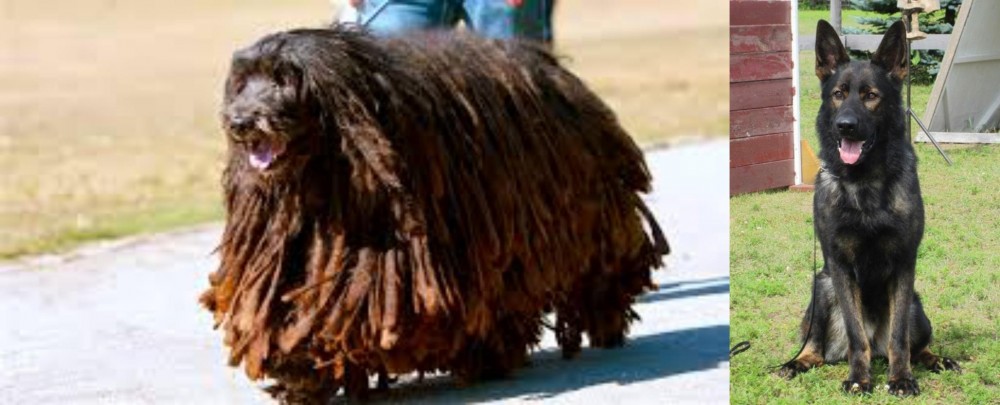 Bergamasco is originated from Italy but East German Shepherd is originated from Germany. Both Bergamasco and East German Shepherd are having almost same height. Both Bergamasco and East German Shepherd are having almost same weight. Both Bergamasco and East German Shepherd has almost same life span. Both Bergamasco and East German Shepherd has almost same litter size. Bergamasco requires Moderate Maintenance. But East German Shepherd requires High Maintenance
Bergamasco is originated from Italy but East German Shepherd is originated from Germany. Both Bergamasco and East German Shepherd are having almost same height. Both Bergamasco and East German Shepherd are having almost same weight. Both Bergamasco and East German Shepherd has almost same life span. Both Bergamasco and East German Shepherd has almost same litter size. Bergamasco requires Moderate Maintenance. But East German Shepherd requires High Maintenance
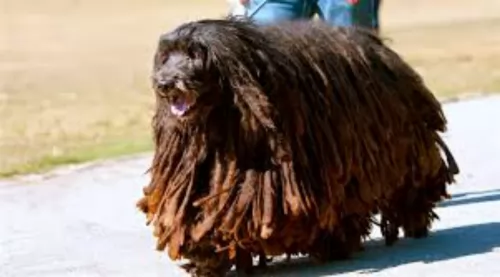 The Bergamasco comes from northern Italy. This medium sized sheepdog is of ancient origin. Known as an Italian sheep herding breed, his name actually comes from the town where he comes from - Bergamo.
The Bergamasco comes from northern Italy. This medium sized sheepdog is of ancient origin. Known as an Italian sheep herding breed, his name actually comes from the town where he comes from - Bergamo.
It was after World War II that there was danger that this breed would disappear as the need for herding and shepherding was diminishing. An Italian breeder, however, Dr. Maria Andreoli, stepped in to save the breed.
It was in 2015 that the American Kennel Club also changed the breed’s status from Miscellaneous to the Herding Group.
 The East German Shepherd is a line of the German Shepherd Dog breed. The German Shepherd Dog came about when the three types of “continental shepherd dogs” separated into the Dutch Shephers, German Shepherd and Belgian Shepherd. In the 1800’s it was local shepherds who bred their dogs and selected the traits they needed in their geography. The result was dogs in various local areas who all could herd and guard flocks; who were intelligent, strong, fast and had a good sense of smell, but their appearance and skills varied from town to town.
The changes in Germany from agriculture and sheep to industrial cities rendered the German Sheep Dog obsolete. But was it really? Many felt the dog could be a good working dog in the cities as well but needed some refinement in the breed according to Max von Stephanite. At a dog show in 1899, he found what he wanted – the perfect working dog.Stephanitz bought the dog and founded the Society for the German Shepherd. (Verein fur Deutsch Schaferhunde) Stephanitz is considered the developer of the German Shepherd Dog.
The East German Shepherd is a line of the German Shepherd Dog breed. The German Shepherd Dog came about when the three types of “continental shepherd dogs” separated into the Dutch Shephers, German Shepherd and Belgian Shepherd. In the 1800’s it was local shepherds who bred their dogs and selected the traits they needed in their geography. The result was dogs in various local areas who all could herd and guard flocks; who were intelligent, strong, fast and had a good sense of smell, but their appearance and skills varied from town to town.
The changes in Germany from agriculture and sheep to industrial cities rendered the German Sheep Dog obsolete. But was it really? Many felt the dog could be a good working dog in the cities as well but needed some refinement in the breed according to Max von Stephanite. At a dog show in 1899, he found what he wanted – the perfect working dog.Stephanitz bought the dog and founded the Society for the German Shepherd. (Verein fur Deutsch Schaferhunde) Stephanitz is considered the developer of the German Shepherd Dog.
The East German Shepherd is a line of the same breed. There are several different lines of the German Shepherd Dog, with slight difference for the reason they were bred. For instance, the German Shepherd Dog is bred for looks while the East German Shepherd is bred to be a working dog. Often called a DDR German Shepherd, they came about from the Deutsche Democratic Republic or the Republic of East Germany. For about 40 years in East Germany these dogs were bred only within the DDR bloodline.
The East German Shepherd is stronger, heavier boned, leaner, more muscular and solid. During the time of the Berlin Wall, from 1961-1989, there were few German Shepherds for breeding stock on either side of the wall, but especially in the East. There the government controlled the development of the breed. They developed a separate registry for the DDR – East German Shepherd. With such strict standards for a perfect working dog and such little breeding stock, the only dogs allowed to reproduce were the ones that passed a rigorous test and were deemed perfect working dogs.
In West Germany they continued to breed for appearance. The West German Shepherd are the most popular ones and are usually simply called German Shepherds. The show dogs of today and the American line came from the West.
Preserving the East German Shepherd today is important and difficult. It means preserving not improving. The Strength of the East German Shepherd is their body line and style, Today’s breeder must maintain this while making sure there is enough diversity in the gene pool to keep the line healthy without losing its body style and working temperament. It is important that the East German Shepherd have a straight back rather than the sloping one of the German Shepherd Dog or the American lines of the GSD. The working dog is also more aggressive and has a much higher work drive than any of the other German Shepherd Dogs lines.
 This medium sized sheepdog stands 54 – 62cm in height and weighs up to 38 kg as an adult. It is his coat which draws the most attention. It is of a coarse texture and actually greasy to the touch. It actually forms into strands or almost like dreadlocks from the top of the body, so that people agree he is one of shaggiest dog breeds there are.
This medium sized sheepdog stands 54 – 62cm in height and weighs up to 38 kg as an adult. It is his coat which draws the most attention. It is of a coarse texture and actually greasy to the touch. It actually forms into strands or almost like dreadlocks from the top of the body, so that people agree he is one of shaggiest dog breeds there are.
From age 1 on the coat starts to become woolly, and then the flocks start to form. As these clumps of hair appear, it will become necessary to separate them into smaller cords by hand to ensure attractive formation Brushing isn’t necessary but a big toothed comb can keep their hair ‘groomed’.
The colour of the coat is solid grey with patches of shades of grey and sometimes black. His dense, heavy coat makes it that he is suited to cooler climates. Because he is a herding dog, he wouldn’t do well in an apartment but would suit a home with a large garden.
He is intelligent and social but will need firm handling as he is a boisterous dog. He has a muscular yet compact body with a large head, long tail, high-set semi-drooping ears and large, gentle looking brown eyes. Although not instinctively aggressive, he makes an excellent watch dog with strong protective instincts to protect his human family.
He views new people into his circle with suspicion and wariness. He is good with kids and pets in the home and is playful and energetic.
 What are the differences between the German Shepherd Dog (GSD) and the East German Shepherd? The East German Shepherd has a straight back and a larger bone structure. He has a very large and block shaped head with a lean, athletic build. His lips are taunt and dark, and his nose must be black. He has a scissor bite and strong teeth. His eyes are medium sized almonds that are slanted slightly. The eyes are also very dark. His ears are erect and not too big. His legs, haunches and feet must all be coordinated so that he trots rather than runs.
What are the differences between the German Shepherd Dog (GSD) and the East German Shepherd? The East German Shepherd has a straight back and a larger bone structure. He has a very large and block shaped head with a lean, athletic build. His lips are taunt and dark, and his nose must be black. He has a scissor bite and strong teeth. His eyes are medium sized almonds that are slanted slightly. The eyes are also very dark. His ears are erect and not too big. His legs, haunches and feet must all be coordinated so that he trots rather than runs.
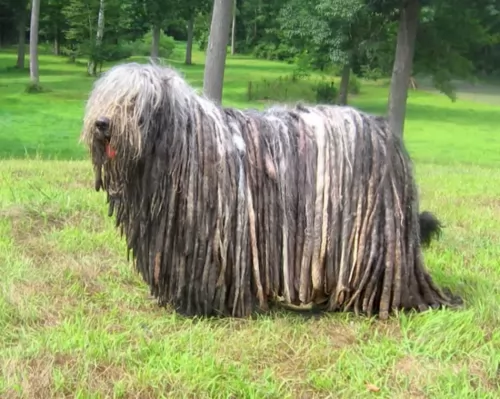 This is a working dog so they are naturally alert. He is also intelligent and independent and this independence is seen with training as he doesn’t take easily to following instructions, becoming stubborn. You’ll certainly want to have your Bergamasco socialized and trained as he can be a boisterous dog, bounding with energy.
This is a working dog so they are naturally alert. He is also intelligent and independent and this independence is seen with training as he doesn’t take easily to following instructions, becoming stubborn. You’ll certainly want to have your Bergamasco socialized and trained as he can be a boisterous dog, bounding with energy.
This is a dog that will need to be kept busy and provided with plenty of activities so that he remains happy, playful and relaxed.
Lively and intelligent, these dogs also form strong bonds with their owners and get on well with the children in the home. He will take well to country life as opposed to living in the city.
 The East German Shepherd is a well- balanced dog. He is sure of himself, friendly, loyal and wants to please his owner. He is intelligent, resilient and attentive. He will make a great family pet. He is aggressive with a high prey drive but that can be tempered with good socialization and training. He is easy to train.
The East German Shepherd is a well- balanced dog. He is sure of himself, friendly, loyal and wants to please his owner. He is intelligent, resilient and attentive. He will make a great family pet. He is aggressive with a high prey drive but that can be tempered with good socialization and training. He is easy to train.
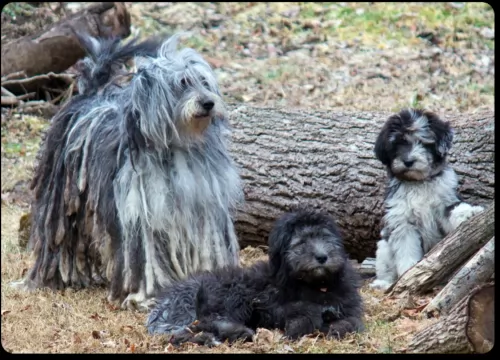 Your Bergamasco can live to be 13 to 15 years of age and he is considered to be a healthy breed. Nonetheless you want to be aware of health issues that are common to this breed
Your Bergamasco can live to be 13 to 15 years of age and he is considered to be a healthy breed. Nonetheless you want to be aware of health issues that are common to this breed
he is vulnerable to heat. He can die of heat exhaustion quicker than other breeds
keep an eye on him for hip dysplasia, progressive retinal atrophy and skin allergies
 Because the East German Shepherd line has been isolated behind the Berlin Wall, there are not many genetic health issues in the line. Most importantly the East German Shepherd shows no hip dysplasia which plagues most GSD. There are a couple of situations to look out for. They are:
Because the East German Shepherd line has been isolated behind the Berlin Wall, there are not many genetic health issues in the line. Most importantly the East German Shepherd shows no hip dysplasia which plagues most GSD. There are a couple of situations to look out for. They are:
A life threatening issue that must be addressed immediately for fear of death. Bloat is caused when a larger dog with a deep chest eats too large a meal before or after strenuous exercise, eats too fast, or drinks too much water. The stomach distends with air or gas and twists. Sometimes it is completely inverted. Get help fast or your dog will die.
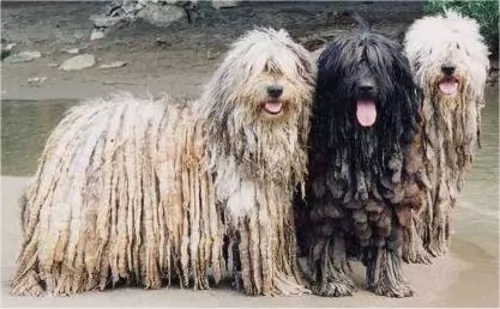 The Bergamasco isn’t a shedder but his coat will need to be combed once a week just to keep it in order. You don’t want to bath him too often, especially during the Winter as his coat takes a long time to dry. It isn’t recommended to shave a Bergamasco as the coat regulates the dogs temperature – keeping him warm and cold as the weather demands.
The Bergamasco isn’t a shedder but his coat will need to be combed once a week just to keep it in order. You don’t want to bath him too often, especially during the Winter as his coat takes a long time to dry. It isn’t recommended to shave a Bergamasco as the coat regulates the dogs temperature – keeping him warm and cold as the weather demands.
They thrive on a blend of kibble (dry) mixed with raw and-or moist food once or twice a day. Remember to include quality chicken, turkey, etc. mixed with some vegetables and rice into your dog’s diet. Ensure a constant supply of fresh water in an easily-cleanable bowl.
Balls and ropes are important for building muscle strength and burning energy. Remember your Bergamasco is a working breed and will need plenty of games and exercise.
 Because these dogs were bred to work you need to feed them a high quality dry food, made for working dogs. It needs to have a good amount of calcium and glucosamine. Feed about 3-4 cups per day divided into 2 feeding times.
Because these dogs were bred to work you need to feed them a high quality dry food, made for working dogs. It needs to have a good amount of calcium and glucosamine. Feed about 3-4 cups per day divided into 2 feeding times.
In addition to bloat as mentioned above, the East German Shepherd can also have both air born, and food born allergies. These are easily treated by your veterinarian.
The East German Shepherd is a high energy, high activity dog so you have some for him. He is agile and athletic. He needs serious exercise and a job is essential. If you can’t give an East German Shepherd a job, then don’t get this dog. He loves tracking and has a high prey drive. Keep him trained, challenged and working. Try tracking and herding trials, obedience, agility, fly ball and bar hunt.